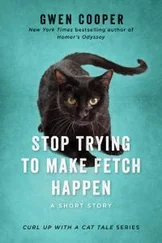Finally Laura stands and says, “Everybody be quiet!” The whole table gets silent as they all turn to stare at her. Laura’s face is a bright, bright red. It’s as red as the little tomatoes that were on top of the salad bowl that got knocked over. Her hands are shaking a bit, but she nevertheless strokes the back of my neck calmly. Then she scoops one hand underneath me and lifts me up the way you’re supposed to pick up a cat when you absolutely have to, and she puts me on the floor, very gently. For a moment, I can’t move. I feel the shock of human hands touching me for the first time in so long. Hands that aren’t Sarah’s. Hands that are warm and not cold the way Sarah’s always were the last few months I lived with her. The table that was so beautiful with food only a little while ago now looks like a pack of dogs ran over it.
This time I don’t run to hide under the couch. This time I run as fast as I can upstairs and into the back of the closet in my room with the Sarah-boxes, burrowing deep beneath the dress with the Sarah-and-me-together smell. I twitch my back muscles so hard I almost give myself a cramp.
I don’t think anybody has ever been treated as cruelly as I’ve been treated tonight. Whenever Sarah used to be upset about something bad that happened to her, she would cheer herself up by saying, Worse things have happened to better people . But I don’t think anything worse than this has ever happened to anybody. Even that long story about what the Hebrews went through seems like nothing in comparison.
I hear Laura’s footsteps coming up the stairs, but they pause when Josh follows her. “I just want to check on Prudence and make sure she’s okay,” she tells him in a low voice.
“I’m sure she’s fine,” Josh says in an equally low voice. “She’s just a little rattled. Come back down and help me straighten out the table.”
“I will,” Laura tells him. “I’ll be back in a minute.”
Josh’s footsteps start to go back down the stairs when I hear Laura say, “Josh?” She’s silent for a moment. “I’m sorry about this. I really wanted everything to be perfect.”
“It is perfect. Well,” Josh adds, “maybe we got a bit of unexpected dinner theater.” He chuckles. “But everything can be salvaged. No harm done.”
“I know, but …” Laura falls silent again. “It’s the first time we’ve had your parents over for dinner,” she finally says. “I don’t want them to think that … I just don’t think Prudence knew any better. Letting her eat on the table is exactly the kind of thing my mother would’ve done.”
“Prudence is a cat , Laura.” Josh’s voice is gentle when he makes this (obvious) statement. “Of course she didn’t know any better. Nobody thinks it reflects on you or your mother.”
As if I were the one with bad manners!
“I’ll be down in a minute,” Laura says again. Her footsteps continue up the stairs and down the hall until she’s standing in the doorway of my room. “Prudence?” her voice whispers into the darkness. “Prudence, are you okay?”
I can tell she’s waiting for me to meow in response, but I have nothing to say to Laura right now. “Prudence?” she whispers again. I turn around three times in Sarah’s dress and wait for Laura to leave so the room will be silent and I can fall asleep—even though I never did get anything to eat for dinner except for the dried chicken soup I lick off my left hind paw.
5
Laura
LAURA DYEN’S FAVORITE PLACE IN THE WORLD, WITH THE EXCEPTION of her own bed on a Sunday morning, was found on the forty-seventh floor in the Midtown offices of Neuman Daines. The forty-seventh floor was assigned to the Corporate group, and Laura frequently had a quick lunch of deli sandwiches with her fellow fifth-year associates in what was grandly referred to as the forty-seventh-floor conference room—although in truth it was no more than a smallish meeting space. They’d spread newspapers and legal pads over the surface of the round table, where reflected globes of white light from the overhead fluorescents floated like water lilies in its cherrywood depths.
Often they used these group lunches as an opportunity to solicit one another’s unofficial input on opinion or adversary letters they were working on. But the lunches were primarily about camaraderie. Once they’d been a group of thirty first-years who’d started out as summer associates together. Now they were eight, the rest having left for other firms. Laura had gotten the same early-morning phone calls from recruiters as the others—still got them, in fact—but she’d also understood, in a way few people her age did, that those who jump around early usually end up jumping around forever. All she’d had to do to recognize the truth of this was look at her mother.
As much as Laura appreciated the fraternal spirit of these impromptu lunches, it was the early-morning or late-evening hours, when the conference room was empty, that she enjoyed most. She could look through the windows and all the way down onto the silent diorama of the city streets below, and the very silence of it soothed her. The Empire State Building was more than ten blocks away, but the illusion created by the height of her own building made it seem as though she were level with its peak. On hot summer nights, Laura would watch as its pinnacle was repeatedly struck by heat lightning, a display of kinetic energy rendered mute by the thick, reinforced windows of her office building. She’d grown up in a neighborhood loud with the twenty-four-hour cacophony of dance music blared from boom boxes, of police sirens and domestic arguments and glass shattering on pavement, the all-night hum of after-hours partiers that gave way each morning to the rumble of overcrowded buses and the metal clank of store grates rolling up. In the five-story walk-up she and Sarah had lived in, these sounds had been a constant assault, even with the windows closed. And they’d been intensified by the noise from their own building, babies wailing and neighbors flushing toilets or walking on the floors overhead.
People talked about the views to be had on higher floors, but Laura knew it was the silence, the serenity of heights, that one paid obscene sums for in a city like New York. Noise was one of a thousand indignities visited upon the poor. Money was the only thing that could buy the illusion of peace.
Perry had learned to look for Laura in the forty-seventh-floor conference room when the rest of the office was quiet. It was here that she came to think, to give her mind the break from computer screens and buzzing BlackBerrys and allow it to formulate creative solutions to knotty problems.
Perry poked his head in now and said, “It’s almost nine o’clock. You should get home to your husband like a good newlywed.”
Laura turned her face from the window. “I can’t. Clay just dumped this project for Balaban Media on me.” Clayton Newell was Neuman Daines’s managing partner, and a figure of terror to all the firm’s associates. “He says he needs it turned around by seven o’clock Monday morning.”
“Yes, but you and I both know Clay won’t be in Monday before ten thirty. It’ll keep.” Perry smiled. “The key to having a life in this business is training people to expect the best of you, not all of you at once.”
Perry Steadman was Laura’s “rabbi,” a senior partner who had recognized Laura’s potential early on and taken her under his wing. He was a short man in his fifties with thinning hair and a laid-back approach to his practice and his negotiations that belied the sharp mind at work behind them. And even though Perry’s “rabbi” designation was strictly metaphorical, he had a true rabbi’s fondness for quoting the Talmud. “Two cripples don’t make one dancer,” he’d told Laura more than once. “Everybody’s a cripple to some extent. The trick is never putting together two parties who are equally crippled, or crippled in the same way. Otherwise you’ll be up to your eyeballs in paperwork when they realize they can’t dance together.”
Читать дальше












